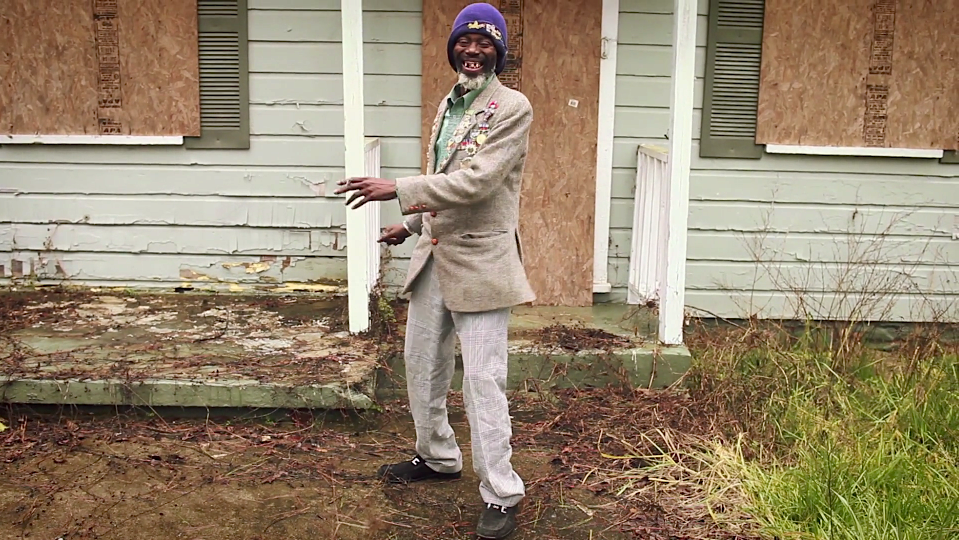If you were to write Thomas Bennett into a work of fiction, you’d likely hear complaints that his character seems too “unrealistic” — his speech is too erratic, his clothing too exaggerated, his tragic life-story too Dickensian. However, as the old adage goes, “Truth is often stranger than fiction”, and Thomas Bennett — the eponymous subject of Nathan Honnold’s deeply personal and poetic documentary — is no exception.
Before we even see a glimpse of Thomas, we’re greeted by his voice, softly emoting a sweet hymn from the darkness: Steal away, steal away home / I ain’t got time, I ain’t got long to stay here. Honnold came to know Thomas in a very similar manner. “One day while walking through the park with my camera,” Honnold said, “I heard a voice singing hymns through the trees. As I followed the voice, I found myself face-to-face with Thomas Bennett.” Dressed in a medal-laden faded black trench coat and Los Angeles Police Department cap, Thomas stops singing, stares directly into the camera and smiles, a wide full-mouthed grin. It’s the first of many intimately personal moments in the film, the lens just feet away from Thomas’ greying goatee, basking in the man’s delight, in no rush to leave his side anytime soon. “Immediately, I knew I had found my character,” Honnold said, “so I started filming him. After he was done singing we discussed working together to make a documentary and he informed me that he had already won an Emmy and an Oscar.”
“I wish I could go back to being a kid…I would wish to Almighty God to just start over again.”
Thomas (much like the heroes of Honnold and co-director Alex Zhuravlov’s previous film, LaDonna) lives on the outskirts of what most would call “normal” society, so pinning Thomas down to a seat for a planned “talking head” would have felt disingenuous. Honnold skirted around this by following Thomas around to “his favorite places — McDonald’s, Krispy Kreme, and the park — to [interview him] where he felt safe.” It’s in these sacred locations that Thomas recalls his life. Standing (and occasionally dancing) before a boarded-up shack, Thomas explains how his mother gave him up for adoption; the empty house behind him is where he spent fourteen years in foster care. As a child, he was beat up constantly. The years following weren’t much kinder: Thomas got drafted into the Army and shipped overseas (where he killed at least one Japanese soldier, he says). Upon returning, he spent (an unspecified amount of) time in a homeless shelter. When it was discovered that he had contracted AIDS, Thomas was kicked out of the shelter and forced to move into a housing project, where he’s spent the last sixteen years of his life. “Do people ever think you’re homeless?” Honnold asks. “Yeah,” Bennett replies, “because of the hat and the cap on my head. They think I was homeless, but I’m the homie.”
For nearly a year, Honnold followed Thomas around with a Canon 5D Mk II, logging over thirty hours of footage and becoming friends with the hymn-singing character in the process. He credits the camera for allowing him unfettered access and spontaneity: “Due to the small size of the camera, [I was] able to capture personal and intimate moments without the intrusion of large gear…The shots in the film were never planned, but I did create a shot list for what I thought would show Thomas best, cinematically. However, when the days of production came and the schedules were presented to Thomas he would always have another idea and location that he wanted to show me instead.” But the toughest part of the process? That was knowing when to stop. “Deciding when I had enough footage was the toughest part for me,” Honnold said. “With character-driven documentaries, you always wonder, ‘If I shoot another day, that might be the day I’ll get the perfect shot.'”
The friendship between Honnold and our protagonist is absolutely palpable; he treats Thomas not as a subject, but as an equal, refusing to poke fun at the man’s eccentricities or wallow in the more heart-breaking details, training his camera on Thomas as one might a loved-one. While it may appear simplistic, Thomas Bennett hits a raw nerve, wrapping you up in a loving embrace full of kindness and admiration.
Honnold is currently knee-deep in pre-production on his latest short film entitled Miami Monster, a story about “a washed-up beauty queen who finds a wretched monster on a Miami nude beach. She becomes the monster’s Pageant-Mom and proceeds to exploit him on YouTube.” You can find out more about Miami Monster (and help fund it) on Kickstarter.

 Ben Watts
Ben Watts